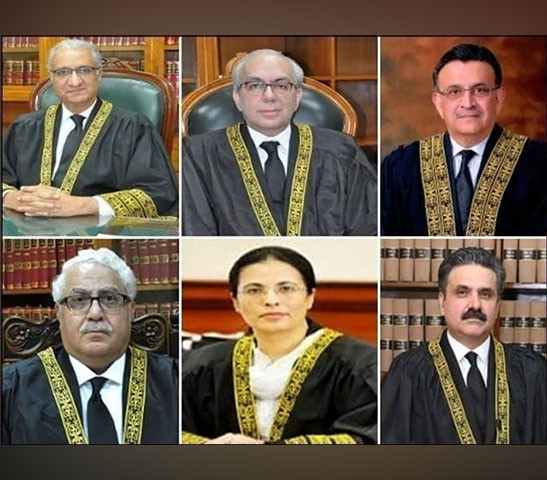Plea for SC full court turned down
Visiting rights granted to families of 102 suspects under army custody, says AGP, assuring action against mistreatment

The Supreme Court, led by Chief Justice of Pakistan Umar Ata Bandial, has maintained a stance in rejecting pleas for the formation of a full court to preside over high-profile cases in recent years, despite the desires of some judges, raising concerns about the top court's credibility.
In a significant development, a larger bench of the apex court, headed by Chief Justice Bandial, on Wednesday rejected a plea from civil society members. The plea had sought the constitution of a full court to hear petitions challenging the trial of civilians in military courts under the Army Act.
The six-member larger bench, led by the chief justice of Pakistan, comprised Justice Ijazul Ahsan, Justice Munib Akhtar, Justice Yahya Afridi, Justice Sayyed Mazahar Ali Akbar Naqvi and Justice Ayesha Malik heard the case on Wednesday.
“We do not look for the support to anyone except Allah Almighty. We will continue to work, whether someone likes or not. These matters are for the history and people to decide,” the CJP remarked.
“It's for the people to decide as to which law should prevail [in the country]. So we will continue the proceeding,” the top judge added while declining the civil society members plea.
However, the CJP appreciated Faisal Siddiqi Advocate for filing the plea.
The CJP noted that two larger benches were constituted in the recent past but they could not function.
Stressing the importance of time, the top judge maintained that some judges were on leave while others had to go on vacation. He said a few judges had come for the hearing of this case while being on leave.
The repeated refusal to entertain the formation of a full court has considerably undermined the moral authority of the Supreme Court. Moreover, several decisions made by a specific group of apex court judges are yet to be implemented, further adding to concerns about the court's ability to effectively enforce its rulings.
While some lawyers dismiss the possibility of judicial politics in both cases, the refusal to form full courts raises concerns over the authority and coherence of the judiciary.
"This was the last hope for all Supreme Court judges to sit together during CJ Bandial's tenure," said a lawyer who witnessed the court hearing on Wednesday.
However, it remains unclear whether all judges were opposed to the formation of a full court. It is anticipated that irrespective of the judgment, a review petition may be filed during the tenure of the next CJ, Justice Qazi Faez Isa.
As for the verdict, CJP Bandial explained that “two larger benches were formed but were unable to function”, possibly referring to the nine-member larger benches formed for electoral matters and the present case.
Interestingly, questions raised by Justice Athar Minallah regarding the dissolution of two provincial assemblies were not included in the written order.
Notably, two senior judges were included in nine-member larger benches without any prior informal discussion with them while Justice Isa, since the enactment of the Supreme Court Practice Procedure Act 2023, has not been assigned to any bench.
On the other hand, the CJP expressed his belief that the history and the people of the country will ultimately pass judgment on the decisions made by the Supreme Court.
Another lawyer who witnessed the hearing noted that Chief Justice Bandial wanted to deliver a 'landmark judgment' in this case before his retirement, indicating his intention to leave a lasting impression with his ruling.
Recent judicial history suggests that several chief justices have made efforts to give decisions against the military establishment in order to establish their legacies. During the tenure of the late CJP Iftikhar Muhammad Chaudhry, for instance, the famous 35 missing persons cases posed significant challenges to the establishment. Similarly, CJP Asif Saeed Khosa took up a petition against the extension of Army Chief Qamar Javed Bajwa's tenure.
It is pertinent to note that during a special bench hearing led by CJP Bandial on petitions against Punjab Assembly Deputy Speaker Dost Mazari's ruling, PML-Q lawyer Salahuddin Ahmed had expressed that the public was already well aware of the governance of both the Sharifs and the Chaudhrys. He asserted that “no sky would fall” if either were in power.
However, he raised concerns regarding the public perception that only a select few judges handled important political matters, arguing that such an impression would “certainly be akin to a sky falling”. Ahmed once again requested the formation of a full bench to address the matter.
Since the ouster of Imran Khan from the PM’s office through a vote of no-confidence in April last year, several requests were made by both sides – government and PTI – for the constitution of a full court in several matters.
After the in-house change, the PTI had moved an application requesting the bench to constitute a full court hearing presidential reference regarding the interpretation and scope of Article 63A of the Constitution.
However, the PTI did not press that application before the bench.
The PDM had requested a three-judge bench of the Supreme Court led by CJP Bandial to form a full court hearing the matter regarding the interpretation of Article 63A of the Constitution after then Punjab Assembly deputy speaker Dost Mazari discarded 10 PML-Q MPAs votes in the provincial chief minister election.
However, their request was turned down.
Subsequently, the PDM and others boycotted the court proceedings.
The debate over the formation of a full court resurfaced when Chief Justice Bandial took suo motu notice of the delayed announcement of elections for the Punjab and Khyber-Pakhtunkhwa assemblies. However, he decided against forming a full court to address the issue.
Moreover, Justice Athar Minallah, in his judicial note, emphasised that the interpretation of the constitution was both the prerogative and duty of the court.
He noted it was also an onerous duty to protect, preserve and defend the constitution. It has been observed by this court that the constitution is an organic document designed and intended for all times to come. Interpretation of the constitution by this court has a profound impact on the lives of the people of this country, besides having consequences for future generations.
The framers of the constitution have conferred an extraordinary jurisdiction on this court under Article 184(3). The manner in which this power is to be exercised is in itself a matter of immense public importance. While invoking the jurisdiction great care has to be exercised. Article 176 of the Constitution describes the constitution of this court, the note read.
“I am of the opinion that it is implicit in the language of Article 184(3) that the conferred extraordinary original jurisdiction must be entertained and heard by the Full Court. In order to ensure public confidence in the proceedings in hand and keeping in view the importance of the questions raised for our consideration, it is imperative that the matter regarding the violation and interpretation of the Constitution is heard by a full court."
The interpretation of Article 184(3) of the Constitution in this context, therefore, also requires interpretation,” Justice Minallah, who is not included in the larger bench hearing SC (Practice and Procedure) Act 2023, said.
Senior lawyers have expressed the belief that the controversy surrounding the holding of elections could have been better managed if a full court had been formed to hear the matter.
Since a presidential reference was filed against Justice Qazi Faez Isa back in May 2019, the Supreme Court has been divided into two ideological factions. One section argues for the regulation of the discretionary powers of the chief justice, while the other holds the view that the chief justice is the master of the roster in the formation of benches.
It is believed that the formation of a full court was necessary to address the matter at hand as the inclusion of all judges when there are diverse opinions among the top court judges.



















COMMENTS
Comments are moderated and generally will be posted if they are on-topic and not abusive.
For more information, please see our Comments FAQ